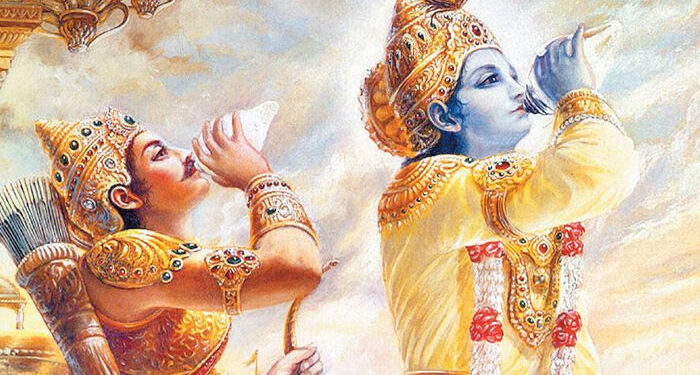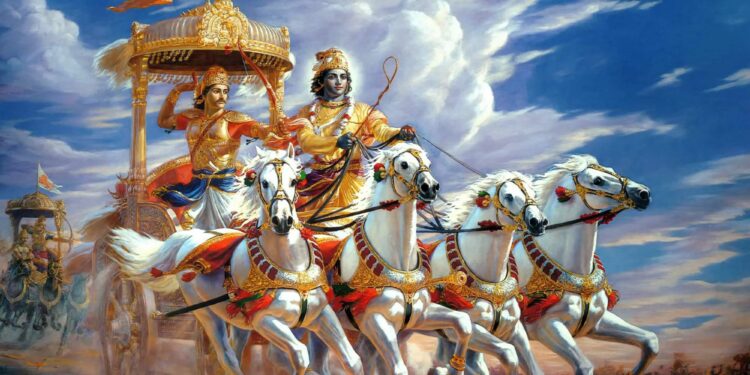TEXT 16
kiṁ karma kim akarmeti
kavayo ‘py atra mohitāḥ
tat te karma pravakṣyāmi
yaj jñātvā mokṣyase ‘śubhāt
SYNONYMS
kim—what is; karma—action; kim—what is; akarma—inaction; iti—thus; kavayaḥ—the intelligent; api—also; atra—in this matter; mohitāḥ—are bewildered; tat—that; te—unto you; karma—work; pravakṣyāmi—I shall explain; yat—which; jñātvā—knowing; mokṣyase—you will be liberated; aśubhāt—from ill fortune.
TRANSLATION
Even the intelligent are bewildered in determining what is action and what is inaction. Now I shall explain to you what action is, knowing which you shall be liberated from all misfortune.
PURPORT
Action in Kṛṣṇa consciousness has to be executed in accord with the examples of previous bona fide devotees. This is recommended in the 15th verse. Why such action should not be independent will be explained in the text to follow.
To act in Kṛṣṇa consciousness, one has to follow the leadership of authorized persons who are in a line of disciplic succession as explained in the beginning of this chapter. The system of Kṛṣṇa consciousness was first narrated to the sun-god, the sun-god explained it to his son Manu, Manu explained it to his son Ikṣvāku, and the system is current on this earth from that very remote time. Therefore, one has to follow in the footsteps of previous authorities in the line of disciplic succession. Otherwise even the most intelligent men will be bewildered regarding the standard actions of Kṛṣṇa consciousness. For this reason, the Lord decided to instruct Arjuna in Kṛṣṇa consciousness directly. Because of the direct instruction of the Lord to Arjuna, anyone who follows in the footsteps of Arjuna is certainly not bewildered.
It is said that one cannot ascertain the ways of religion simply by imperfect experimental knowledge. Actually, the principles of religion can only be laid down by the Lord Himself. Dharmaṁ tu sākṣād bhagavat-praṇītam (SB 6.3.19). No one can manufacture a religious principle by imperfect speculation. One must follow in the footsteps of great authorities like Brahmā, Śiva, Nārada, Manu, the Kumāras, Kapila, Prahlāda, Bhīṣma, Śukadeva Gosvāmī, Yamarāja, Janaka, and Bali Mahārāja. By mental speculation one cannot ascertain what is religion or self-realization. Therefore, out of causeless mercy to His devotees, the Lord explains directly to Arjuna what action is and what inaction is. Only action performed in Kṛṣṇa consciousness can deliver a person from the entanglement of material existence.
TEXT 17
karmaṇo hy api boddhavyaṁ
boddhavyaṁ ca vikarmaṇaḥ
akarmaṇaś ca boddhavyaṁ
gahanā karmaṇo gatiḥ
SYNONYMS
karmaṇaḥ—of work; hi—certainly; api—also; boddhavyam—should be understood; boddhavyam—should be understood; ca—also; vikarmaṇaḥ—of forbidden work; akarmaṇaḥ—of inaction; ca—also; boddhavyam—should be understood; gahanā—very difficult; karmaṇaḥ—of work; gatiḥ—entrance.
TRANSLATION
The intricacies of action are very hard to understand. Therefore one should know properly what action is, what forbidden action is, and what inaction is.
PURPORT
If one is serious about liberation from material bondage, one has to understand the distinctions between action, inaction and unauthorized actions. One has to apply oneself to such an analysis of action, reaction and perverted actions because it is a very difficult subject matter. To understand Kṛṣṇa consciousness and action according to its modes, one has to learn one’s relationship with the Supreme; i.e., one who has learned perfectly knows that every living entity is an eternal servitor of the Lord and that consequently one has to act in Kṛṣṇa consciousness. The entire Bhagavad-gītā is directed toward this conclusion. Any other conclusions, against this consciousness and its attendant actions, are vikarmas, or prohibited actions. To understand all this one has to associate with authorities in Kṛṣṇa consciousness and learn the secret from them; this is as good as learning from the Lord directly. Otherwise, even the most intelligent persons will be bewildered.


















